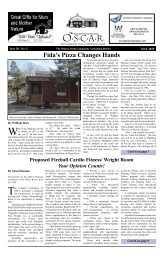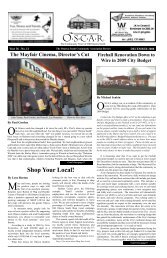Create successful ePaper yourself
Turn your PDF publications into a flip-book with our unique Google optimized e-Paper software.
Page 40 The <strong>OSCAR</strong> - OUR 38 th YEAR DEC 2011<br />
BACKYARD BEAT<br />
By Cst. Khoa N. Hoang<br />
There are many challenges in policing<br />
and the issue surrounding use of<br />
force is one of them. No matter what<br />
topic I’m presenting everyone wants<br />
to know about use of force; that’s the<br />
official terminology when an officer<br />
uses any kind of force on someone<br />
else.<br />
It can be a bit frustrating for<br />
someone like me who is trying to<br />
market the <strong>Ottawa</strong> Police Service as<br />
an intelligent business, focussed on<br />
strategic forward thinking with effective<br />
technique based training... Don’t<br />
care? Neither do many others.<br />
I’m constantly being asked in no<br />
particular order, “Have you shot anyone?<br />
Have you been shot at? When<br />
will you shoot someone?” And despite<br />
my best efforts to avoid the topic because<br />
there are simply more important<br />
issues, I must concede to the fact that<br />
people are genuinely interested in police<br />
use of force.<br />
Who can blame them for such<br />
curiosity? Television doesn’t help<br />
my cause much. But our police officers<br />
are the only ones walking around<br />
with weapons and expected by society<br />
By Bob Jamieson<br />
If things are going well in your life,<br />
you probably have many things<br />
for which to be thankful. And you<br />
are particularly fortunate if you have<br />
elderly parents who are still in good<br />
physical and mental condition. While<br />
your parents are healthy, you should<br />
to use it at the appropriate time. And<br />
that’s when the challenging part begins,<br />
using it at the appropriate time,<br />
duration, intensity, and legally.<br />
There are many variables that will<br />
determine the effectiveness of a use of<br />
force incident. All of which I can tell<br />
you are very scary no matter how long<br />
you’ve been a police officer. I’ve lost<br />
count at how many people have tried<br />
to fight me, and I’m just happy I have<br />
been able to come home for Christmas<br />
dinner every year.<br />
Once a police officer realizes that<br />
someone is about to attack them, their<br />
body creates a physiological reaction<br />
similar to everyone else. Adrenaline<br />
instantly occurs, fine motor skills become<br />
difficult, and everyone will experience<br />
a loss in hearing and vision<br />
of some sort.<br />
What differs from the general<br />
public is that your police officers go<br />
through extensive training to combat<br />
and control the very physiological<br />
responses that hinder their ability to<br />
react appropriately. Officers are educated<br />
on the human body’s response<br />
to stress and trained to overcome it to<br />
perform their duties. It goes against<br />
human instinct to run towards gun<br />
take the opportunity to discuss matters<br />
of significance - such as their financial<br />
situation.<br />
There are probably many things<br />
you’d rather do than talk about finances<br />
with your parents -but it’s a<br />
conversation you need to have, because<br />
there is a lot that you need to<br />
discover. So, find a comfortable time<br />
shots, but I promise your officers will,<br />
when the time comes.<br />
But physically surviving a use of<br />
force encounter is completely different<br />
from legally surviving. Our officers<br />
have to be able to justify their<br />
use of force, days, months, and maybe<br />
even years after the incident is over.<br />
Failure to survive the incident legally<br />
could not only cost you your job but<br />
the media coverage is sometimes<br />
worse then any punishment you can<br />
have, justified or not.<br />
This is usually when I see disconnect<br />
between the police and the public,<br />
and I admit the police can do more<br />
public education on the Use of Force<br />
Model. But we really don’t have the<br />
time to be teaching it to everyone<br />
either.<br />
The latest Ontario Use of Force<br />
Model was revised in 2004, a circle<br />
shaped diagram that breaks down how<br />
our police officers are to respond during<br />
a perceived incident. Now the key<br />
word is “perceived” because there are<br />
many factors that will play into how<br />
each of us responds to a similar situation.<br />
Depending on your size, skill,<br />
experience, background, and what<br />
in which to talk to your parents, approach<br />
the subject in as unemotional<br />
a manner as possible, and try to elicit<br />
the following pieces of information:<br />
Location of investments - It isn’t<br />
necessarily essential that you know<br />
precisely which investments and life<br />
insurance policies your parents own.<br />
But it is important that you know<br />
some things. Do they work with a<br />
financial advisor? If so, whom? Are<br />
their investments and life insurance<br />
policies spread out among a variety of<br />
financial institutions? You’ll need to<br />
be familiar with these things in case<br />
your parents become incapacitated<br />
or die unexpectedly. You can avoid<br />
“unclaimed” property, including investments,<br />
from slipping through the<br />
cracks if you are aware of these details.<br />
Insurance Coverage for Health<br />
and Medical Needs - Long-term care<br />
and health care expenses can be a major<br />
concern of the elderly. That’s why<br />
you need to know who’s insuring your<br />
parents and where your parents keep<br />
information related to their insurance<br />
policies. You should also have a basic<br />
understanding of any health insurance<br />
program they may have through<br />
a current or former employer for the<br />
payment of doctors’ bills, some prescription<br />
drugs and related services.<br />
And even so, your parents may need<br />
supplemental insurance policies. Of<br />
course, the chances are pretty good<br />
that your parents already know all<br />
these things; nevertheless, it doesn’t<br />
hurt to make sure they’re well informed<br />
and that their health-care bills<br />
are under control.<br />
Existence of a Will - If you don’t<br />
is observed, each of us will respond<br />
slightly differently to the same scenario.<br />
The option to use force can vary<br />
greatly from physical grabbing, to a<br />
gun being fired, and of course everything<br />
in between.<br />
The model’s shape is circular because<br />
situations are dynamic and can<br />
change, requiring officers to constantly<br />
adapt. The core of the model shows<br />
three arrows one after another labelled<br />
assess, plan, and act. Perception and<br />
tactical considerations are a constant<br />
throughout the entire situation.<br />
Taking up the largest space in the<br />
model is a suspect’s behaviour; this is<br />
recognized as the most important factor<br />
on how an officer will respond. A<br />
suspect’s behaviour can range from<br />
cooperative all the way to threats of<br />
serious bodily harm or death. It is<br />
gradually shaded from white to black,<br />
demonstrating that there are many<br />
emotional states within the spectrum.<br />
Police officers responses are expected<br />
to be within the outside rim<br />
of the model, using anything from<br />
communication, which is constant<br />
Cont’d on next page<br />
Talk to Elderly Parents about Their Financial Situation<br />
know if your parents have a Will<br />
now is the time to find out. And if<br />
they don’t have a Will, urge them<br />
to have one prepared. Your parents<br />
have worked hard all their lives and<br />
they undoubtedly want their assets<br />
distributed according to their wishes,<br />
and not according to a court’s decree,<br />
which is what would happen if they<br />
die “intestate” (without a Will). Even<br />
if your parents have a simple Will,<br />
they may still need to take further action.<br />
If you believe they have a sizable<br />
estate or want to give significant gifts<br />
to charitable groups, encourage them<br />
to consult with a lawyer who specializes<br />
in estate planning.<br />
Willingness to create power of attorney<br />
- By creating a durable power<br />
of attorney, your parents will name<br />
someone to make financial and/or<br />
health care decisions on their behalf<br />
should they become unable to do so.<br />
As you might suspect, this is a sensitive<br />
topic, so you’ll want to approach<br />
it with great care. By bringing up<br />
these issues with your parents, you<br />
can gain some valuable knowledge of<br />
their financial situation today - and a<br />
clearer understanding of what you can<br />
do to help them in the future.<br />
If you have questions regarding<br />
this article or other aspects of financial<br />
planning or investments, please<br />
give me call at 613-526-3030. You’re<br />
also welcome to drop in to our <strong>December</strong><br />
Open House.<br />
Bob Jamieson, CFP<br />
Edward Jones, Member<br />
Canadian Investor Protection<br />
Fund










